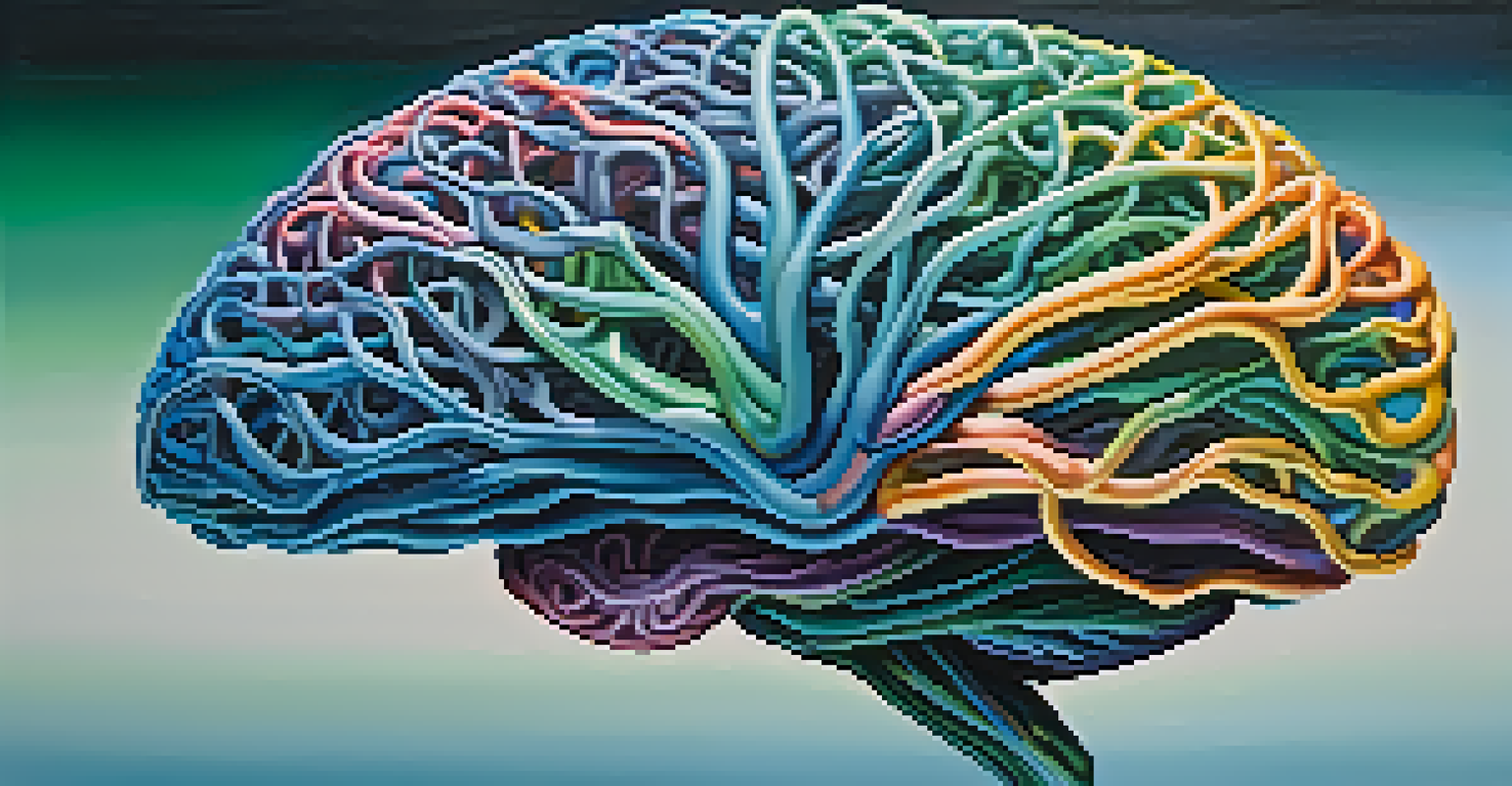Microdosing and Neuroplasticity: Changing the Brain

Understanding Microdosing: An Overview
Microdosing refers to the practice of consuming very small doses of psychedelics, typically around one-tenth of a standard recreational dose. This approach aims to enhance creativity, productivity, and emotional well-being without producing the intense experiences associated with full doses. Many individuals are turning to microdosing as a potential alternative to traditional medication for conditions like anxiety and depression.
Psychedelics can be a catalyst for profound personal change and transformation.
The concept has gained traction in recent years, fueled by anecdotal reports and a growing body of research. Users often describe subtle shifts in mood and cognition, which can lead to enhanced performance in both personal and professional settings. This has sparked interest in how microdosing could influence neuroplasticity—the brain's ability to adapt and change throughout life.
As we delve into the connection between microdosing and neuroplasticity, it's essential to understand how these small doses might catalyze significant changes in brain function. With this backdrop, we can explore the science behind microdosing and its potential benefits for brain health.
What is Neuroplasticity and Why Does It Matter?
Neuroplasticity is the brain's remarkable ability to reorganize itself by forming new neural connections throughout life. This adaptability is crucial for learning, memory, and recovery from injuries. Think of it like a river that can carve out new paths over time; the more you use certain pathways, the stronger they become.

This capability is particularly significant in today's fast-paced world, where constant learning and adaptation are essential. Neuroplasticity allows individuals to develop new skills, manage stress, and even recover from trauma. It underpins how we can improve our mental health and cognitive abilities, making it a vital aspect of our overall well-being.
Microdosing Enhances Creativity
Many individuals report that microdosing helps overcome creative blocks and fosters new inspiration in their work.
Understanding neuroplasticity helps us appreciate the potential impact of practices like microdosing. If microdosing can facilitate neuroplastic changes, it could open up new avenues for personal growth and healing.
The Science Behind Microdosing and the Brain
Research suggests that psychedelics, even in small doses, can increase neurogenesis—the growth of new neurons—and enhance synaptic plasticity. These processes are critical for learning and memory. For example, studies have shown that compounds like psilocybin can promote the formation of new connections between neurons, which may help improve cognitive flexibility.
The brain is capable of remarkable changes throughout life, and microdosing may help unlock that potential.
Moreover, microdosing may also reduce anxiety and depression by promoting a healthier balance of neurotransmitters like serotonin. These changes could enable individuals to approach challenges with a fresh mindset, making it easier to learn and adapt. The idea is that by gently nudging the brain's chemistry, microdosing creates an optimal environment for growth.
While the science is still emerging, the preliminary findings are encouraging. They highlight the potential for microdosing not only to enhance creativity but also to support mental health through neuroplastic changes.
Real-Life Experiences with Microdosing
Many individuals who practice microdosing share transformative experiences that resonate deeply. For instance, a graphic designer reported that microdosing helped her overcome creative blocks, enabling her to approach projects with newfound inspiration. These personal stories often illustrate the subtle but impactful shifts in mindset that can accompany microdosing.
Others have noted improvements in emotional resilience. A software engineer shared that microdosing allowed him to manage stress more effectively, leading to a more balanced life. These anecdotes highlight the potential benefits of microdosing beyond the scientific data, offering relatable insights into its transformative power.
Neuroplasticity Supports Growth
The brain's ability to reorganize itself through neuroplasticity highlights the potential benefits of microdosing for personal development and mental health.
While individual experiences can vary widely, they collectively contribute to a growing narrative about the positive impacts of microdosing on mental health and cognitive function. As more people share their stories, the conversation around microdosing and neuroplasticity continues to evolve.
Potential Risks and Considerations
Despite the promising potential of microdosing, it's crucial to approach this practice with caution. Not everyone responds positively to psychedelics, even in small doses, and adverse effects can occur. Some users report increased anxiety or discomfort, especially if they have a history of mental health issues.
Additionally, the legality of psychedelics varies by region, which can present challenges for individuals interested in microdosing. It's essential to research local laws and consider the implications of using substances that may be regulated or illegal in your area. Seeking guidance from professionals who understand these substances can provide valuable insights.
Ultimately, anyone considering microdosing should weigh the potential benefits against the risks. It’s advisable to approach it mindfully and, if possible, consult with a healthcare provider to ensure a safe and informed experience.
Integrating Microdosing into Daily Life
If you’re considering microdosing, it's helpful to start with a structured approach. Many individuals choose to follow a schedule, such as dosing every three days, to monitor their experiences and adjust as needed. Keeping a journal to track mood changes, productivity levels, and creativity can offer insights into how microdosing impacts your daily life.
Creating a supportive environment is also essential. Engaging in activities like meditation, mindfulness, or creative exercises can amplify the benefits of microdosing. By integrating these practices, you not only enhance your microdosing experience but also create a holistic approach to personal growth.
Cautions of Microdosing Practice
While microdosing offers promising benefits, it is essential to consider individual responses and legal implications before starting this practice.
Lastly, remember that everyone's journey is unique. What works for one person may not work for another, so it’s important to remain open to adjustments and listen to your body’s responses as you explore microdosing.
The Future of Microdosing and Neuroplasticity Research
As interest in microdosing grows, researchers are increasingly focused on understanding its long-term effects on neuroplasticity. Future studies aim to uncover how consistent microdosing might influence brain structure and function over time. This could lead to more personalized approaches to mental health treatment, using microdosing as a tool for healing and growth.
Additionally, as the stigma around psychedelics diminishes, more rigorous scientific research is likely to emerge. This could validate anecdotal claims and provide a clearer picture of microdosing's potential benefits and drawbacks. The hope is that these findings will contribute to a broader acceptance of psychedelics in therapeutic settings.

Ultimately, the future of microdosing and neuroplasticity holds exciting possibilities. By continuing to explore this intersection, we may unlock new strategies for enhancing mental health and cognitive abilities, paving the way for innovative treatments.